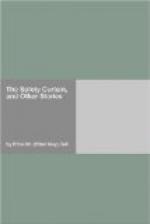“I don’t know why you say that.” There was quick protest in the girl’s voice. She clattered the cups and saucers as if something in the lazy argument had exasperated her. “I like a man who is a man—the hard, outdoor, wholesome kind—who isn’t afraid of taking a little trouble—who knows what he wants and how to get it. I shouldn’t quarrel with him on the score of muddy boots. I should be only glad that he had enough of the real thing in him to go out in all weathers and not to care.”
“All of which is aimed at me,” said Hugh to the trees above him. “I’m afraid I’m boring you more than usual this afternoon.”
“You can’t help it,” said Doris.
Hugh Chesyl’s good-looking face crumpled a little, then smoothed itself again to its usual placid expression. “Ah, well!” he said equably, “we won’t quarrel about it. Let’s have some tea!”
He sat up in the punt and looked across at her; but she would not meet his eyes, and there ensued a considerable pause before he said gently, “I’m sorry you are not happy, you know.”
“Are you?” she said.
“Yes. That’s why I want you to marry me.”
“Should I be any happier if I did?” said Doris, with a smile that was somehow slightly piteous.
“I don’t know.” Hugh Chesyl’s voice was as pleasantly vague as his personality. “I shouldn’t get in your way at all, and, at least, you would have a home of your own.”
“To be miserable in,” said Doris, with suppressed vehemence.
“I don’t know why you should be miserable,” he said. “You wouldn’t have anything to do that you didn’t like.”
She uttered a laugh that caught her breath as if it had been a sob. “Oh, don’t talk about it, Hugh! I should be bored—bored to death. I want the real thing—the real thing—not a polite substitute.”
“Sorry,” said Hugh imperturbably. “I have offered the utmost of which I am capable. May I have my tea here, please? It’s less trouble than scrambling ashore.”
She acceded to his request without protest; but she stepped on to the bank herself, and sat down with her back to a corn-sheaf. Very young and slender she looked sitting there with the sunshine on her brown, elf-like face, but she was by no means without dignity. There was a fairy queenliness about her that imparted an indescribable charm to her every movement. Her eyes were grey and fearless.
“How lovely to own a field like this!” she said. “And plough it and sow it and watch it grow up, and then cut it and turn it into sheaves! How proud the man who owns it must be!”
Something stirred on the other side of the sheaf, and she started a little and glanced backwards. “What’s that?”
“A rat probably,” said Hugh Chesyl serenely from his couch in the punt. “I expect the place is full of ’em. Won’t you continue your rhapsody? The man who owns this particular field is a miller as well as a farmer. He grinds his own grain.”




